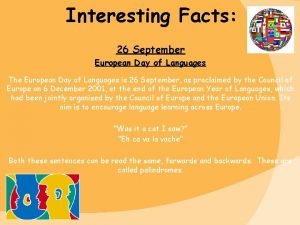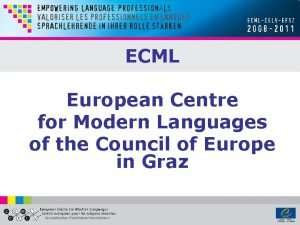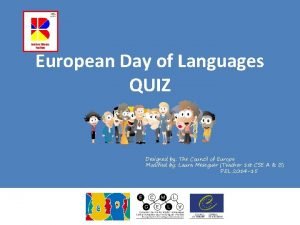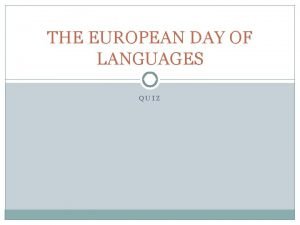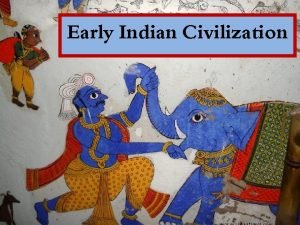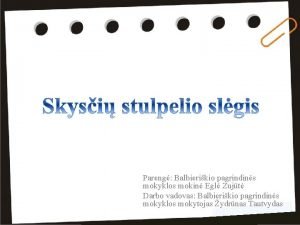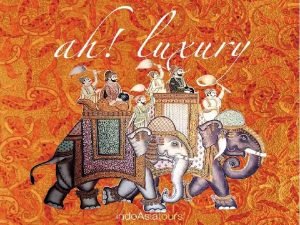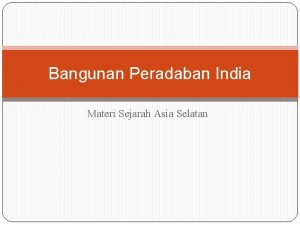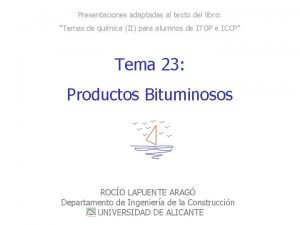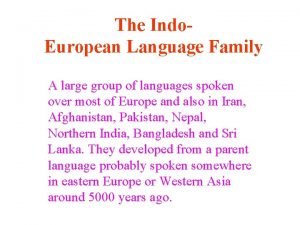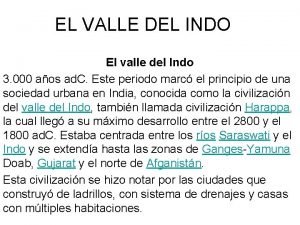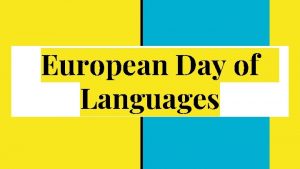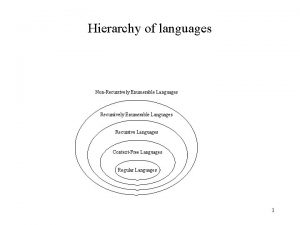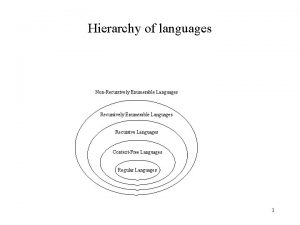Indo European Spread of Indo European Languages GermanicCelts





























- Slides: 29

Indo European Spread of Indo- European Languages Germanic/Celts/ Romans 12/29/2021 1

� Indo-Europeans or Proto-Indo-Europeans, who lived in Eastern Europe and Central Asia from some time after 5000 BC. 12/29/2021 2

� Look at daughter languages to find similarities of possible parent 12/29/2021 3

� Indo-European is the largest family, including those of most of Europe, North and South America, Australasia, the Iranian plateau and much of South Asia. 12/29/2021 4

� Sometime between 3500 BC and 2500 BC, the Indo-Europeans began to fan out across Europe and Asia. 12/29/2021 5

� Hellenic � Italic � Indo-Iranian � Celtic � Germanic � Armenian � Balto-Slavic � Albanian 12/29/2021 6

� The common ancestry of these diverse languages exists in cognates (similar words in different languages). For example: three in English, tres in Latin, tris in Greek, drei in German, drie in Dutch, trí in Sanskrit. 12/29/2021 7

� Recognition of this common ancestry of Indo. European languages is usually attributed to philologist Sir William Jones in 1786. 12/29/2021 8

� Philology is the study of language in written historical sources. � Knowledge that deals with the structure, historical development, and relationships of a language or languages. 12/29/2021 9

� The Germanic, or Proto. Germanic, language group can be traced back to the region between the Elbe river in modern Germany and southern Sweden some 3, 000 years ago. 12/29/2021 10

� Certain consonants in the Germanic family of languages have shifted somewhat from the Indo-European base. � Shifting of the “p” to “f” and the “d” to “t”. 12/29/2021 11

� Germanic words like the English foot � West Frisian foet � Danish fod � Swedish fot � are related to the Latin ped, Lithuanian peda, Sanskrit pada, � Example: P F D T � Lithuanian: Peda / English: Foot 12/29/2021 12

� Words for natural environment, sea travel, social practice, and farming were borrowed from non Indo-European tribes � Environment: sea � Sea travel: sail � Social practice: bride � Farming: dung 12/29/2021 13

� English belongs to the West Germanic branch of the Indo-European family of languages. � West Germanic languages in orange, yellow, and green 12/29/2021 14

� The earliest inhabitants of Britain about which anything is known are the Celts (the name from the Greek keltoi meaning "barbarian"). 12/29/2021 15

� By around 300 BC, the Celts had become the most widespread branch of Indo -Europeans in Iron Age Europe. 12/29/2021 16

� Between 500 BC and 400 BC until the Roman occupation, Celtic population in Britain kept increasing, and established a vibrant Celtic culture. 12/29/2021 17

� Many British place names have Celtic origins, including Kent, York, London, Dover, Thames, Avon, Trent, Severn, and Cornwall � The influence of the Celtic language itself on English is marginalized, although they were dominant in the earliest formative years 12/29/2021 18

� Romans first entered Britain in 55 BC under Julius Caesar. 12/29/2021 19

� They did not begin a permanent occupation until 43 AD, when Emperor Claudius sent a much better prepared force to subjugate the fierce British Celts. Queen Boudicca, or Boadicea , led a Celtic uprising against the Romans in 61 A. D. – although unsuccessful she remains a great part of Modern British Folklore 12/29/2021 20

� Britain remained part of the Roman Empire for almost 400 years. � The cultures and people interbred. � This legacy takes the form of less than 200 “loanwords” coined by Roman merchants and soldiers. 12/29/2021 21

� win (wine) � butere (butter) � caese (cheese) � piper (pepper) 12/29/2021 22

� The Roman Empire was failing, the Romans did a final withdrawal by 436 AD. � Only the rich and noble classes ever spoke Latin, and that status is still visible today. 12/29/2021 23

� Your professor will put you into groups randomly. You may not select your group. � On a piece of paper, write all your names. � Ask one member to clearly write the answers. � Another group will check your answers and score the quiz. � You can get answers to the quiz at the end. 12/29/2021 24

� 1. T/F Indo-Europeans or Proto-Indo. Europeans are the same people. � 2. What is the comparative method? � 3. By what year (B. C. ) had the main language groups of Indo-Europeans split? � 4. Three in English, tres in Latin, tris are examples of _____. � 5. T/F Philology is the study of language in spoken historical sources 12/29/2021 25

� 6. When we look at Germanic words like feet, we can see a _____ shift (Example: foot / peda). � 7. Name two areas of life from which Germanic tribes borrowed words of predecessors. � 8. T/ F English belongs to the Low Germanic branch of the Indo-European family tree. � 9. Who are the earliest inhabitants of Britain in recorded history? 12/29/2021 26

� 10. When was Celtic culture most vibrant in Briton? � 11. Who was Emperor of Rome in 55 B. C. when the Romans first entered Briton? � 12. Britain was to be subjugated under the Roman Empire for _____ years. � 13. Give two examples of Latin loanwords to English. � 14. *OPEN ENDED QUESTION* If Latin was only ever spoken by the upper class (rich /educated) people of Roman Britain, what can we assume about Latin’s influence on Briton’s general population? 12/29/2021 27

� 1. T (they are the same people) � 2. Look at daughter languages to find similarities of possible parent � 3. 1, 000 B. C. � 4. Cognates � 5. F – WRITTEN / not SPOKEN � 6. Consonant � 7 natural environment, sea travel, social practice, and farming � 8 F English belongs to the West Germanic branch of the Indo-European family of languages. 12/29/2021 28

� 9. the Celts � 10. Between 500 BC and 400 BC until the Roman occupation � 11. Julius Caesar � 12. 400 � 13. win (wine) butere (butter) caese (cheese) piper (pepper) � 14. We can assume (most accurately guess) that Latin didn’t often come into contact with the general public. 12/29/2021 29
 Characteristics of indo european languages
Characteristics of indo european languages Indo iranian languages
Indo iranian languages What languages come from latin
What languages come from latin Are celts indo european
Are celts indo european Dispersal ap human geography
Dispersal ap human geography Facts about the european day of languages
Facts about the european day of languages European center for modern languages
European center for modern languages Epostl
Epostl European center for modern languages
European center for modern languages Fisker frits fisker friske fisk
Fisker frits fisker friske fisk European day of languages quiz
European day of languages quiz Fisker frits fisker friske fisk
Fisker frits fisker friske fisk Indo aryan
Indo aryan Indo-us dollar matching grant project
Indo-us dollar matching grant project Ayran ka sutra
Ayran ka sutra Nuo ko priklauso skysčio slėgis į indo dugną?
Nuo ko priklauso skysčio slėgis į indo dugną? Pacific spanish mackerel
Pacific spanish mackerel Indo asia leisure services ltd
Indo asia leisure services ltd Temple
Temple Indo arya dan dravida
Indo arya dan dravida Sistema de numeração indo-arábico
Sistema de numeração indo-arábico La centrifugacion
La centrifugacion Biodiversity hotspots in india
Biodiversity hotspots in india Indo-europeans definition
Indo-europeans definition How to spread cold butter
How to spread cold butter Spread of the industrial revolution map
Spread of the industrial revolution map Reformation ap world history
Reformation ap world history Number system developed by hindu philosopher
Number system developed by hindu philosopher David ripplinger
David ripplinger The spread of greek culture
The spread of greek culture





